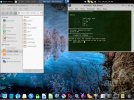Thanks - but not sure after reading that thread if it was Nvidia or X or FreeBSD or a combination of all of them that made it a bit of a mission!
I vaguely remember installing Mint on machine with Nvidia and needing a bit of help from a famous search engine to get it going.
Anyway, think I'm dragging this off-topic! As with most things, YMMV.
sorry for the delay, had a death in the family, haven't been on here in a while. but yes, I actually figured that issue out, it was the Dell AIO. frustrated with the system constantly giving me gui issues, even though xfce had a day or two where it worked fine, I tried elementary then ubuntu, both of which would not draw gui correctly.
after talking with an expert (family friend), he said to me "oh, it must have an intel hd xxxx". going back to my cli, yes, he was correct. something about it gets too hot with specific os's and drivers, and he told me to install Windows and it'll give no issues. He was correct. So I was telling my mom about his advice, confused obviously, and she says, "wait, can I have it? if so, can you get this ugly beast out of my living room?" I had given her my old gaming system when I upgraded as she needed a pc for keeping books for the farm. So I went from a Dell AIO giving me nothing but issues to putting FreeBSD on my laptop (non-gui) and using my Windows+Docker+Ubuntu WSL2 as a solo system, then I took Fedora and put it on the old gaming hardware. Now I have a FreeBSD server, Fedora Workstation, and this PC, but I only use this more powerful desktop to control all three via vscode.
The past couple of days have been busy ones and I am just getting back into the saddle. Needless to say, that old Dell gave me a headache, but before I installed FreeBSD for real, I installed it from memory with xfce. It flew like nobody's business. I still back the claim that nvidia is causing issues, note that on my Dell laptop, an AMD system, xfce and gnome worked perfectly. Gnome was a headache on the nvidia system, but only with the window drawing for the terminal and file manager. everything else seemed okay, but it was still off-putting.
I am learning more and more every day. Eventually, I will have some expert knowledge on FreeBSD, but until then, I'll just instigate here and there for fun (no, seriously kidding!). Yeah, those nvidia drivers, i don't understand them, they work fine on Fedora, but not on FreeBSD. meh.
It doesn't matter at this point. I now have the perfect setup for development training and operations. Is there nothing vscode can't do? Honestly, how did MS do it? What a wonderful piece of software.


